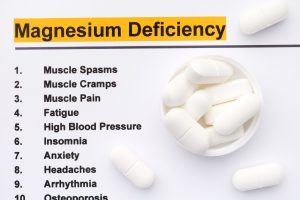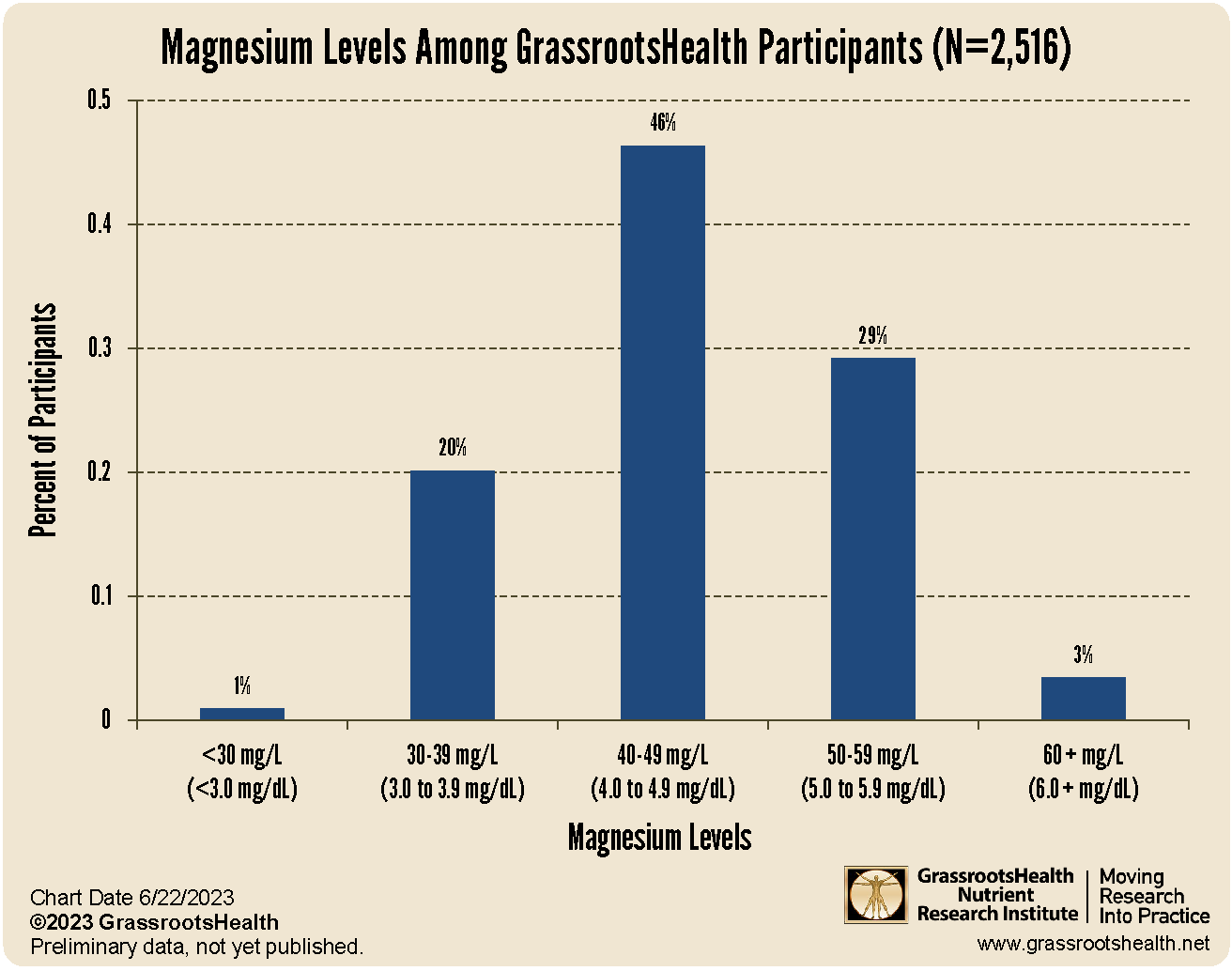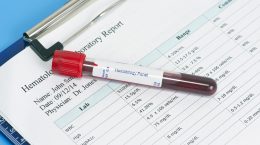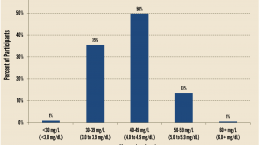Published on July 7, 2023
Magnesium levels improved among 67% of those who re-tested their magnesium level – what is your level compared to others, and can it also be improved?
Key Points
- 2,516 GrassrootsHealth participants have tested their magnesium levels at least once; 486 participants have tested their magnesium level two or more times
- The average magnesium level among participants was 45 mg/L; this is on the higher end of the lab reference range of 29-51 mg/L, which is the range of the average population the lab serves, and does not necessarily indicate the optimal range for health. Aiming for the higher end of this range is likely a good target to help ensure you are getting enough magnesium and to avoid magnesium deficiency.
- 67% of participants who re-tested their magnesium level improved their magnesium status after their first test
 One of the most important minerals in the body is magnesium. Magnesium is essential for energy production, important for your brain and bone health, blood glucose control, DNA and genetic material, blood pressure, detoxification processes, and for helping activate vitamin D in your body. In fact, low magnesium can prevent vitamin D levels from increasing with supplementation and can alter the effects of vitamin D on health outcomes.
One of the most important minerals in the body is magnesium. Magnesium is essential for energy production, important for your brain and bone health, blood glucose control, DNA and genetic material, blood pressure, detoxification processes, and for helping activate vitamin D in your body. In fact, low magnesium can prevent vitamin D levels from increasing with supplementation and can alter the effects of vitamin D on health outcomes.
It’s believed that about 80% of Americans don’t get enough magnesium, and as you age, your body becomes less efficient at absorbing magnesium. Magnesium deficiency is common world-wide and low magnesium levels have been linked to atrial fibrillation (irregular heart rate), hypertension, cardiovascular disease, insulin resistance, type 2 diabetes, and migraines. Magnesium has also been associated with a reduced risk of breast cancer, decreased post-exercise pain and anxiety, and improved cognitive health.
Magnesium Levels among GrassrootsHealth Participants
The whole blood magnesium test offered by GrassrootsHealth includes the amount of magnesium in your blood cells as well as the plasma/serum, which is a better indicator of magnesium status than the serum magnesium test offered by most doctor’s offices and hospitals.
In 2019, GrassrootsHealth started offering a whole blood magnesium blood spot test through our Magnesium*PLUS Focus project. Since then, 2,516 participants have tested their magnesium levels at least once; 486 participants have tested their magnesium level two or more times. The chart below shows the most recent test result among participants who have measured their Magnesium levels.
The average magnesium level among participants was 45 mg/L, which is on the higher end of the lab reference range. The reference range of the whole blood magnesium test is 29-51 mg/L, which is the range of the average population the lab serves, and does not necessarily indicate the optimal range for health. Aiming for the higher end of this range is likely a good target to help ensure you are getting enough magnesium and to avoid magnesium deficiency.
67% of GrassrootsHealth Participants who re-Tested Magnesium Improved their Level!
Additionally, 486 participants have completed at least two magnesium tests. Among these participants, 67% improved their magnesium status after their first test. This indicates that when individuals are provided with a measurement about their health (in this case, their magnesium level), they are empowered to make changes and to take charge of their own health (by taking steps to improve that measurement).
Thanks to all who are participating!
What is Your Magnesium Level Compared to the GrassrootsHealth Cohort?
The only way to know is to test your levels! Magnesium, along with vitamin D, zinc, and omega-3s, are just a few nutrients vital to maintaining many aspects of our health. To know if you are getting enough, make sure you test today!
Testing versus blind supplementation is essential to know for sure if what you are taking is the right amount for you. Once you test your vitamin D (and other levels) to know where you are NOW, you can account for any upcoming changes in lifestyle over the coming months and adjust your intake to reach (or maintain) your targets.
- Vitamin D
- Magnesium PLUS Elements
- Omega-3 Fatty Acids
- hsCRP
- HbA1c
- TSH
- Type 1 Diabetes Autoantibodies
Did you know that each of the above can be measured at home using a simple blood spot test? As part of our ongoing research project, you can order your home blood spot test kit to get your levels, followed by education and steps to take to help you reach your optimal target levels. Start by enrolling and ordering your kit to measure each of the above important markers, and make sure you are getting enough of each to support better mood and wellbeing!
Create your custom home test kit today. Take steps to improve the status of each of these measurements to benefit your overall health. With measurement you can then determine how much is needed and steps to achieve your goals. You can also track your own intakes, symptoms and results to see what works best for YOU.
Enroll in D*action and Test Your Levels Today!
How can I track my nutrient intake and levels over time?
To help you track your supplement use and nutrient levels, GrassrootsHealth has created the Personal Health Nutrient Decision System called

For each specific supplement, you can track what days you take it, how much, and many other details. This will help you know your true supplemental intake and what patterns of use work for you to reach and maintain optimum nutrient levels. Check it out today!






